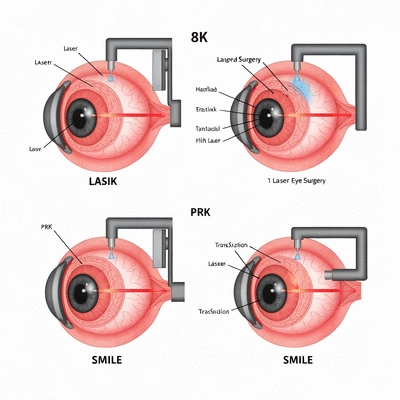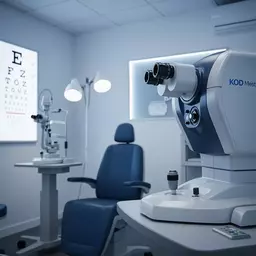Choosing Your Ideal Laser Eye Surgery

Have you ever wondered how laser eye surgery could change your life? With the advancements in technology, understanding your options can empower you to make informed decisions about your vision correction journey.
What You Will Learn
- A comprehensive overview of the most common types of laser eye surgery, including LASIK, PRK, SMILE, and Advanced PRK.
- Key differences in procedures and recovery times, helping you choose the best option based on your lifestyle and eye health.
- The significance of wavefront technology in achieving sharper vision and reducing aberrations.
- Important financial considerations, including typical costs and insurance coverage options for laser eye surgery.
Laser Eye Surgery Costs: A Procedure Comparison
This visual offers a side-by-side comparison of the typical costs associated with different laser eye surgery procedures, helping you understand the financial aspects of each option.
LASIK
Quick recovery, minimal discomfort
$2,000 - $3,000
per eye- ✓Reshapes cornea using laser
- ✓Treats nearsightedness, farsightedness, astigmatism
- ✓Flap created, then laid back
PRK
Suitable for thinner corneas
$1,500 - $2,500
per eye- ✓Epithelial layer removed
- ✓Cornea reshaped by laser
- ✓Protective contact lens for healing
SMILE
Minimally invasive, newer technique
$2,500 - $4,000
per eye- ✓Femtosecond laser creates lens
- ✓Small incision for removal
- ✓Corrects myopia effectively
Advanced PRK
Customized treatment, enhanced precision
$1,500 - $3,000
per eye- ✓Utilizes wavefront technology
- ✓Enhanced individual customization
- ✓Aims for improved visual quality
Understanding Laser Eye Surgery: An Overview of Your Options
When it comes to vision correction, laser eye surgery offers several options tailored to individual needs. The most common types include LASIK, PRK, SMILE, and Advanced PRK. Each procedure has unique features that cater to various refractive errors and patient preferences. For a deeper dive into the specific procedures, explore our guide on laser eye surgery types explained.
For instance, LASIK is renowned for its quick recovery time and minimal discomfort, while PRK is often recommended for patients with thinner corneas. SMILE offers a minimally invasive alternative, and Advanced PRK provides enhanced precision for certain vision conditions. Understanding these options is the first step in your vision correction journey!

Exploring Common Types of Laser Eye Surgery
- LASIK: A popular choice that reshapes the cornea using a laser, improving focus for nearsightedness, farsightedness, and astigmatism.
- PRK: Similar to LASIK, but involves removing the epithelial layer before reshaping the cornea, making it suitable for patients with thin corneas.
- SMILE: A newer technique that uses a femtosecond laser to create a small incision for correcting myopia, providing a less invasive option.
- Advanced PRK: Incorporates wavefront technology for a more customized treatment, targeting specific visual corrections.
As you consider these procedures, think about your lifestyle and vision needs. For example, LASIK might be ideal if you're looking for a quick return to daily activities, while PRK might be a better fit if you have specific eye health concerns.
How Each Procedure Works: A Step-by-Step Guide
Understanding what to expect during your surgery can help ease any apprehensions. Here’s a brief overview of the procedural steps involved in each type:
- LASIK: After numbing drops are applied, a flap is created in the cornea. The laser reshapes the underlying tissue, and the flap is laid back in place.
- PRK: The epithelial layer is removed, and the cornea is reshaped using a laser. A protective contact lens is placed on the eye for healing.
- SMILE: A laser is used to create a small lens within the cornea, which is then removed through a tiny incision, correcting myopia effectively.
- Advanced PRK: Similar to PRK, but utilizes wavefront technology for enhanced individual customization, improving overall visual quality.
Each of these procedures aims to correct refractive errors, so it's essential to discuss with your surgeon which option feels right for you. Knowing the steps involved can help you feel more secure about your surgery.
The Role of Wavefront Technology in Laser Eye Surgery
One exciting advancement in laser eye surgery is wavefront technology. This technology takes a detailed map of your eye, allowing for a more customized approach to your treatment. By measuring how light travels through your eye, we can address not just your refractive error but also any higher-order aberrations that may affect your vision. For more information on the factors that affect the cost of these advanced procedures, you can read about the factors affecting laser eye surgery cost.
With procedures like LASIK and SMILE utilizing wavefront technology, patients often experience better outcomes—sharper vision, reduced glare, and enhanced overall visual quality. This level of precision can be a game-changer for many!
Evaluating Your Needs: Factors to Consider for Choosing the Right Procedure
As you consider laser eye surgery, it's crucial to evaluate your vision needs thoroughly. Factors such as your lifestyle, professional requirements, and personal vision goals will influence which procedure may be the best fit for you.
In my experience at VisionCost Insights, understanding your candidacy criteria—like corneal thickness and overall eye health—is essential for determining the most suitable option. Let's dive deeper into these considerations!
We Want to Hear From You!
What factors are most important to you when choosing a laser eye surgery procedure? Share your thoughts below:
Financial Considerations: Understanding Costs and Insurance Options
When considering laser eye surgery, it's crucial to understand the associated costs and how they fit into your financial plans. The typical costs can vary widely based on the procedure chosen, the technology used, and the surgeon's expertise. For instance, procedures like LASIK often carry a different price tag than SMILE or Advanced PRK. It's essential to get a clear picture of these costs upfront, as this will help you plan accordingly.
Additionally, various factors can influence the final price, including the clinic's location, the surgeon's experience, and whether the procedure involves advanced technology. By being informed, you can make a more confident decision about your vision correction journey.

Breaking Down the Cost of Laser Eye Surgery
Let's dive deeper into the typical costs associated with laser eye surgery:
- LASIK: Generally ranges from $2,000 to $3,000 per eye.
- PRK: Typically costs between $1,500 and $2,500 per eye.
- SMILE: Costs can vary from $2,500 to $4,000 per eye depending on the technology used.
- Advanced PRK: This may be priced similarly to PRK, around $1,500 to $3,000 per eye.
Knowing these ranges can help you understand what to expect and set realistic financial goals for your surgery.
Navigating Insurance and Payment Options
Insurance coverage for laser eye surgery can be a bit tricky, as many policies view it as an elective procedure. However, some plans do cover part of the costs, especially if the surgery is deemed medically necessary. It's essential to check with your insurance provider to see what options are available.
In addition to insurance, many clinics, including those I recommend at VisionCost Insights, offer financing options to make the procedure more affordable. Some common options include:
- Payment Plans: Many clinics allow you to pay over time with manageable monthly payments.
- Health Savings Accounts (HSAs): If you have an HSA, you can use those funds to cover surgery costs.
- Credit Options: Some facilities partner with financial institutions to provide credit specifically for medical procedures.
Having these options can take some of the stress out of financing your surgery, allowing you to focus on achieving clearer vision. To better understand how different procedures compare in terms of cost and value, consider reading our analysis on LASIK, PRK, and SMILE value comparison.
Consultation Fees and Out-of-Pocket Expenses: What to Expect
Before undergoing laser eye surgery, you'll likely attend a consultation to evaluate your candidacy and discuss potential procedures. This initial appointment may have its own costs, ranging from $100 to $300, depending on the clinic. It’s important to factor these fees into your overall financial planning.
Additionally, keep in mind that there may be other out-of-pocket expenses to consider:
- Preoperative Assessments: Tests to ensure your eyes are healthy may incur additional charges.
- Follow-Up Visits: Post-surgery checkups are crucial for recovery and could have associated costs.
- Medications: You may need eye drops or medications during your recovery phase.
Understanding these potential expenses will aid in comprehensive financial planning, helping you prepare for your vision correction journey with confidence.
Recap of Key Points
Here is a quick recap of the important points discussed in the article:
- Types of Procedures: The most common options include LASIK, PRK, SMILE, and Advanced PRK, each tailored to different vision needs.
- Unique Features: LASIK offers quick recovery; PRK is suitable for thinner corneas; SMILE is minimally invasive; Advanced PRK utilizes wavefront technology for precision.
- Understanding the Process: Knowing the procedural steps helps ease apprehensions— LASIK involves creating a flap, while PRK removes the epithelial layer.
- Financial Considerations: Costs vary significantly across procedures, and it's essential to explore insurance options and payment plans.
- Consultation Costs: Initial consultations may incur fees, and it's crucial to prepare for potential out-of-pocket expenses related to preoperative assessments and follow-ups.
Frequently Asked Questions About Laser Eye Surgery
- What are the main types of laser eye surgery discussed?
- The article discusses LASIK, PRK, SMILE, and Advanced PRK, each offering unique benefits for vision correction.
- How do the costs of LASIK, PRK, and SMILE compare?
- LASIK typically ranges from $2,000-$3,000 per eye, PRK from $1,500-$2,500 per eye, and SMILE from $2,500-$4,000 per eye.
- What is wavefront technology and how does it benefit laser eye surgery?
- Wavefront technology creates a detailed map of your eye, allowing for customized treatment that addresses refractive errors and higher-order aberrations, leading to sharper vision and reduced glare.
- Does insurance cover laser eye surgery costs?
- Many insurance policies consider laser eye surgery an elective procedure, but some may cover part of the costs if deemed medically necessary. It's best to check with your provider.
- What other expenses should I anticipate besides the procedure cost?
- You should budget for consultation fees (typically $100-$300), preoperative assessments, follow-up visits, and any necessary medications during recovery.








